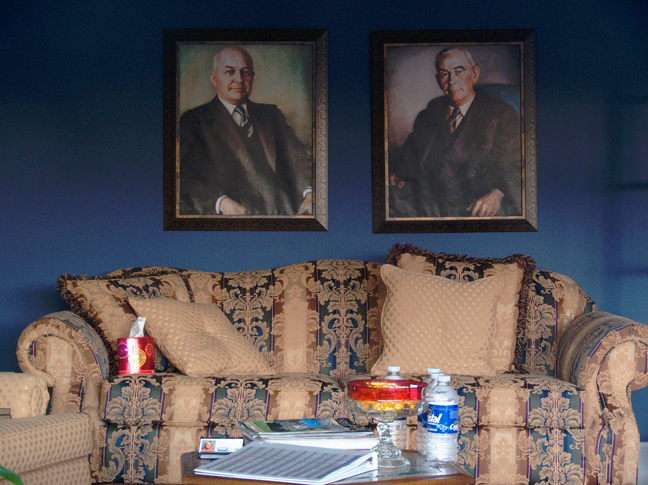
Despite the highly theatrical bipartisan healthcare summit last week, things in Washington and beyond have not changed much. In fact, they may even be worse. And the reason is interesting: Mine vs. Ours. Let me explain. Long time ago, a friend of mine and I started a business, a photography business. Our business is not the one pictured above. Our business failed. Though businesses fail for a host of reasons, ours failed because of basic differences in our personalities. And from news in the sciences this week, I'd guess those difference were groomed into each of us from birth onward, a chemical consequence of which of our genes were switched on and which were not by interactions we each had with our caregivers and our environment. According to a recent episode of PBS's science series NOVA entitled Ghost in Your Genes, researchers Moshe Szyf and Michael Meaney of McGill University observed two mother rats, both with fresh litters of pups. One of the mothers was religiously meticulous in licking and grooming her offspring. The other was quite "paws off", doing only the minimum or less in caring for her charges. In a later version of the experiment, the two mothers had their succeeding litters switched, the second mother raised the first mother's pups and the first mother raised the second's. When mature, the adult social behavior of all four sets of pups were compared. The results were quite surprising. One would have expected all the pups from each genetically related mother to display similar behavioral traits, no matter which mother raised them. But that isn't what was observed. What was observed was that all of the offspring raised by each of the mothers showed similar behavior and that behavior differed significantly from what was observed within both groups raised by the other mother. Szyf and Meaney traced those character differences back to very specific chemical activity within cells of the offspring, a strong indication that different sets of genes had been turned on for each of the two groups depending upon which mother had raised the offspring. In other words, gene expression was predictably influenced by a mother's nurturing behavior. That's a very significant twist to the traditional nature vs. nurture debate where nurture has largely been considered the equivalent of software, as in something learned, not a change in genetic hardware, as was observed here. Getting back to the questions why my early business venture failed and why personalities in Washington seem so intractably divided, one needs to ask what kinds of behaviors were influenced by the chemicals being expressed in the two groups of rats. And the answer to that question is their responses to stress. The chemicals expressed or not being expressed in each of the mature offspring mediate the adult rat's behavioral tendencies when under stress. The nurturant mother's charges were more calm, more patient, more sociable, and less visibly distressed by changes in their environment or routine than those rats raised by the more "paws off" mother. Similarly, in the case of my early business venture, my partner and I had very different tolerances for the uncertainties of running a business. My partner dealt with those uncertainties by deciding things quickly, sometimes without due thought, and by attempting to usurp control in ambiguous situations. I, on the other hand, was by comparison more tolerant of ambiguity and often willing to wait for situations to develop on their own, rather than attempt to force things one way or another. For my partner, his "mine" part seemed always to be in jeopardy. He was unwilling or unable to wait out a more workable version of events. And so it seems to be in Washington with one group cringing at the immediate threat of consequence to the "mine" aspects of things, and the other side more implacably willing to patiently hold out or work toward equitable consequences for all, taking the "ours" perspective. No similar studies have yet been concluded with humans, but considering the results of that rat study, it would seem the divide in Washington might not only be a product of differences in ideology, but of differences in biological epigenetic constitution. And if that is so, it's hard to imagine how such a divide might ever be crossed without a pill of some sort. Education, unrelenting social reinforcement, and individual determination can result in marked changes in behavioral tendencies. But as a general rule, the costs are quite high compared to "just doing what comes naturally". That said, is the American ideal of vast ranges of diversity getting along peaceably under one flag in jeopardy? Are we inevitably headed toward a breakup of the United States based on intractable epigenetic divisions?? It's something to think about. |
• Posted: Mar 08, 2010 18:04:19
• Comments Welcome
• Vote CoolPhotoblogs
• Purchase a Print
• Share
Wednesday, February 10th, 2010 Kershaw SC USA |